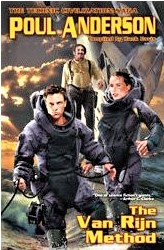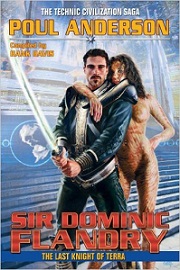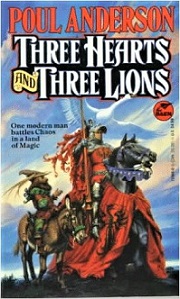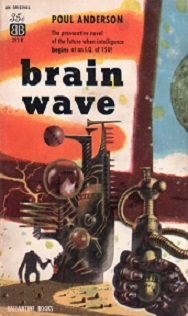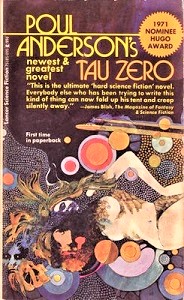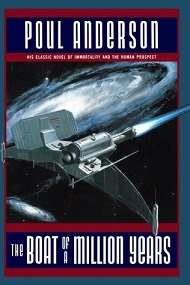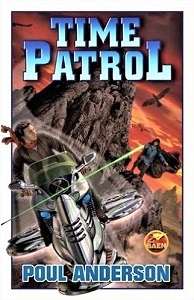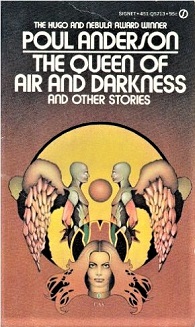Tangent Online Presents:
An Interview with Poul Anderson

(November 25, 1926 – July 31, 2001)
(Poul Anderson photo ©1998, 2016 Dave Truesdale)
Interviewers:
Dave Truesdale & Paul McGuire III
Location:
Minicon 10
Minneapolis, MN, April 18-20, 1975

Interview originally appeared in Tangent No. 2, May 1975, and is reprinted here for the first time. Cover art by Mark Gruenwald.
Introduction
This turns out to be one of the shortest of the many interviews Tangent conducted at Minicon 10 in April of 1975 for the original incarnation of the magazine. It is also the last to be reprinted from the 2nd issue. (The Phil Farmer interview was reprinted for the first time at (the now sadly defunct) SF Site a few days after Phil had passed away in February of 2009, and I have not yet transferred it to the Tangent Online interview section. Note also the misspelling of Phil’s first name on the cover. At the time, Tangent was mimeographed, but the covers were sent to an inexpensive local printer. Mark Gruenwald and I used ye olde Press On clear lettering sheets to set up the names on the covers. Mark happened to do the lettering for the cover that time around and when he dropped it by it was too late to correct the spelling. Such is life.)
It was an honor to have gotten to speak with Poul, someone I’d meet several times over the years, the final time, unfortunately, being at World Fantasy Con in 1998 in Monterey, CA, not quite three years prior to his death.
I’ve always loved his stories and novels. If fact, a few years ago I reread the entire multi-volume sets of his David Falkayn, Nicholas van Rijn, and Sir Dominic Flandry stories and novels lovingly repackaged and published in omnibus editions by Baen Books. They just don’t write’em like that anymore.
Poul Anderson loved to write, and his legion of fans loved what he wrote, as evinced by the many awards he was given throughout his life. A quick listing shows us that Poul won 3 Nebula awards, 7 Hugo awards, a Locus award, a John W. Campbell Memorial Award, 4 Prometheus awards, including a Special Prometheus Award for Lifetime Achievement, a Mythopoeic Award, was named a Gandalf Master of Fantasy, a SFWA Grand Master, and was inducted into the Science Fiction Hall of Fame. All richly deserved.
At some convention or other in the 1980s I found myself in a crowded, shoulder-to-shoulder, jam-packed hotel party room next to Poul. It was quite warm with the press of bodies. He turned and remarked that the party had run out of beer and he was terribly thirsty. I told him to hang on, that I’d be right back. I worked my way out of the room and sped to my hotel room where I had a six-pack of beer on ice. I grabbed it, made my way back to Poul and offered him one, which he gratefully accepted. I pulled myself one from the plastic neck rings and turned away from Poul to pull the tab, lest he get some fizz or spray on him. By the time I had turned around and only just begun to take a first sip from my own beer, Poul had his can upturned, his head back, had finished his beer and was crushing the can in his hand. I offered him another without a word as we traded smiles. That six-pack of beer had a very short life.
Poul’s passing on July 31, 2001 was a terrible loss to the SF field, his family and friends, and everyone who knew him. Coincidentally, Poul passed away six months to the day after one of his longest and closest friends and collaborators, Gordy Dickson, passed away on January 31, 2001.
While nowhere near the most exhaustive or lengthy interview of all the classic interviews from the original Tangent reposted here (many for the first time), at least the following chat with Poul Anderson will give you some insight into one of the most talented, erudite, and highly regarded—not to mention truly nice people—the field has ever known. He was a born storyteller. I urge you to seek out his work.
(Photo below from Minicon 10, April 18-20, 1975. Left to right: Poul Anderson, Lester del Rey, Judy Lynn del Rey.)
![]()
(Photo by Dave Truesdale)
TANGENT: What do you think of the Nebula and Hugo awards?
POUL ANDERSON: Basically, I think it’s a good idea to encourage good writing by rewarding it with some kind of recognition. Inevitably, all such rewards are controversial, of course. The Nebula and Hugo awards together are rather interesting in that respect, too. Although they cover the same field, they are awarded on quite different bases. So, I think it gives a chance for a little more variety of recognition. On the other hand, when recognition is duplicated it becomes that much more meaningful.
TANGENT: How many people actually vote on the Nebula awards?
ANDERSON: I’ve not been in charge of that except that one year, indirectly, when I was President of the SFWA. So, I can’t really say what the current situation is, but during my administration I became very conscious of the fact that there was not enough voting, you know, really not a statistically significant percentage of the membership was voting. There have been continuing efforts to try and improve the situation. I think with some success. I will say though that generally, as far as I know, certainly within my own experience, people are very honest. If they don’t feel they’ve read enough within an area to feel qualified to have an opinion, they tend not to vote at all.
 TANGENT: What are you planning for your next Sir Dominic Flandry novel?
TANGENT: What are you planning for your next Sir Dominic Flandry novel?
ANDERSON: A Knight of Ghosts and Shadows is as far as it’s gone. I would, certainly, like to do more. I’d like to do kind of a ‘Hornblower’ on him, zig-zagging back and forth through his life. This particular novel is not the end of his career after all. I think, probably, some time in the future, he’ll become some gray eminence behind the throne.
TANGENT: Do you write solely for your own entertainment on some things, and on others, what audience do you have in mind? What practical considerations do you have in mind when you write?
ANDERSON: I think the first duty of all art, including fiction of any kind, is to entertain, that is to say, to hold the interest. No matter how worthy the message of something, if it’s dull you’re just not communicating. I found out years ago, the hard way, that it simply doesn’t pay to write something I really don’t want to write. You know, I’ve done it. The books were alright, they made money and so on, but I can make the same money or more on something I enjoy doing. I don’t write anything that doesn’t interest me personally, but you know there is a tremendous range of subjects, some of which are not saleable, so maybe I’ll just write it for its own sake and give it to a fanzine or something. Within these bounds of what is saleable well, yes, I have to be satisfied with it myself, of course.
TANGENT: In plotting a fantasy world—how essential is it to base a fantasy world by the standard’s of today’s world? A lot of what is consistent in our world, with its logice, may not hold true on a purely imaginary world with its logic.
ANDERSON: Well, now that depends on what you’re talking about. In the first place, a great deal of fantasy especially, does not need that because it simply takes a ready-made world. Some fantasies might have a purely contemporary setting, or they might have an archaic but historically real setting, so the author’s already got it made for him. Actually, the construction of an entire world is called for more in science fiction than in fantasy. But I would say that to the extent whether in science fiction or fantasy you are going off into an imaginary world, the more detail, the more construction, the better. But that’s not an invariable rule by any means, you know. Rules were always made to be broken. For example, Tolkien did a magnificent job of constructing an imaginary world in detail. On the other hand, another great fantasist, Lord Dunsany, never bothered.
TANGENT: Do you think the lack of religion in Tolkien’s trilogy took away from the work?
ANDERSON: Well, of course, it’s been argued whether or not there is a lack of religion or not, you know, there are no formalized rights. But Tolkien after all, was a Christian, and certainly The Lord of the Rings is written from a Christian viewpoint. I would guess—my guess is no better than yours—but I would guess that as part of his fantasy construct that the world, at that particular stage of development, was not at a point where formal religion was called for. It’s obviously a world ‘after the fall’, on the other hand, probably before the patriarchs of the Bible.
TANGENT: What would you say then, of Lin Carter’s Imaginary Worlds, which submits that one must include this or that, and so on?
ANDERSON: No, I would disagree. Any such statement would be true of some writers and not of others. Let’s cite James Branch Cabell, for instance. He made no particular effort to be consistent, although most of his books are supposedly in one timeline. If you read them at all closely, you’ll see all sorts of inconsistencies, and obviously Cabell knew this but just didn’t care.
 TANGENT: How much research did you do for A Midsummer Tempest? Has Shakespeare been a long time interest of yours?
TANGENT: How much research did you do for A Midsummer Tempest? Has Shakespeare been a long time interest of yours?
ANDERSON: This is a book I’ve wanted to write for many years, being an old Shakespeare buff. And I could never quite see how to make it go. Finally, almost accidentally one time, my wife, who was aware I wanted to do this said hey, wouldn’t Prince Rupert of the Rhine make a great Shakespearean hero? Wow, let me go! I said. (Laughs) I then did a good deal of research into the period and into the actual history.
TANGENT: What do you think of the pulps, now that they are all but dead?
ANDERSON: Well, the pulp magazines are dead, and the magazine field generally is in a bad way. But I’d say that the old-fashioned pulp novel at least is flourishing as well as ever. It seems they’ve moved over into the paperback books.
But, now, obviously the more markets there are from a writer’s viewpoint the better, not only from a pecuniary viewpoint, but the more activity there is going on, the more vitality there will be in any given field, and the more chance for people to experiment and find new directions and so on. So, yes, I certainly regret the shrinkage of the short story market on such grounds.
TANGENT: What about the short story anthology as a replacement?
ANDERSON: To some extent they’re stepping in to fill that need, but the fact is though, that for whatever reason, by and large, short story collections don’t sell as well as novels. Evidently fewer readers wish to buy a short story collection.
TANGENT: Do you have any personal theories as to why this is?
ANDERSON: Who knows? Writers and other professionals in the field get amazingly little feedback. Science fiction writers get more than anybody else—if they want to accept it. You know, come around to a convention or something. John D. McDonald who has an immense popularity, and well deserved, once remarked that the process of writing is like dropping feathers down a well. So if you hear from 1% of your public one way or the other, you’re lucky.
And of course, by the very fact of communicating that makes them exceptional. That completely anonymous reader out there somewhere is the real controlling force, but nobody knows him and there doesn’t seem to be any way to get to know him.
TANGENT: How much should this anonymous audience dictate what is written, from the viewpoint of sales? Look at the popularity of Perry Rhodan.
ANDERSON: I think this has to be up to the individual writer. If he wants to respond more or less automatically to what he thinks is the market, okay, that’s the way he wants to run his show. There’s nothing evil about it. But on the other hand, most writers don’t feel that way, they want to be more independent.
TANGENT: Wouldn’t that run the risk on the part of the writer of becoming self-indulgent?
ANDERSON: Unless he’s foolish enough to pay a Vanity Press to publish his work—barring that—he’s got to sell it to some publisher who is not in business for his own health. There’s got to be a fair chance of getting at least enough acceptance to make wages. Which means a writer can’t indulge himself too much. Actually, the real self-indulgence is in the sloppy, careless writing. The highly individualistic experimental writers in science fiction, you know, say, the British school, or Samuel Delany’s latest book (ed.: Dhalgren) and so on, whether you like that sort of thing or not, it’s obvious a hell of a lot of work went into it. You know, these guys weren’t indulging themselves, they were sweating themselves.
That sort of thing isn’t my cup of tea. I don’t consider myself qualified to have an opinion on it. I just don’t dig it, but that doesn’t mean that it’s bad. It’s just out of my ballpark. It’s just that, knowing all of Delany’s past work, I know he wasn’t just trying to suck up to anybody or anything like that. He was really trying to give us some kind of testament.
TANGENT: (Laughing) Who do you think wrote Venus on the Half-Shell?
ANDERSON: (Laughing) All I can say is, it wasn’t me. I have heard Phil Farmer guessed. I asked him and he wouldn’t say, but I imagine that’s as good a guess as any. (Laughs)
TANGENT: What do you think of the cycles and trends in science fiction, if they exist at all?
ANDERSON: Well, I think Algis Budrys put it very well once—a passing remark in a review or something: ‘Trends are for second-raters.’ There seems to be an occasional bandwagon, but what really happens is somebody has come along and broken new ground, done something original, and it’s worth exploring, you know, so naturally we all get interested—a lot of us try ourselves out in it too. But as far as making that an all-time direction or something, that is only what people incapable of originality would do. The originators, the ground breakers, they’ve gone on to something else.
I think, basically, that Jim Baen is right in his new direction. Not that there should be any declared moratorium on down-beat stories, but it does look as if that theme has been pretty well worked out, for the time being at least. What new disasters can you think of that haven’t already been done? (Laughs) You get these cycles, you know, about ten years or so ago, there was such a rash of stories, about psionics especially, and we all got sick of ‘psi’, and about ten years before that there’d been such a rash of anti-utopian things, especially bad imitations of The Space Merchants. I at least got the feeling that if I read one more of those I’d have to go and throw up.
TANGENT: What books can we expect from you this year?
ANDERSON: Doubleday should, just about now, be bringing out a collection of short stories and novelettes titled Homeward and Beyond. A couple of which, by the way, have not been published before. But you might as well wait for the paperback. (Laughs) And I’ve just finished, it’s waiting on my desk at home for a last, final go through, a manuscript of a novel for Signet books called A Lady of Andolyn. [Editor’s note, 12-17-2016: I do not know if “Andolyn” is the correct spelling, nor have I been able to find any Poul Anderson book with this title. I am guessing that Signet changed the title upon publication. I would be grateful if anyone having knowledge of this book, or title change, would get in touch with me to clear up this bit of loose end.]
Update–12-22-2016: I would like to thank Craig Neumeier for solving the mystery surrounding the title (and spelling) of the novel Poul Anderson mentioned above, his working title being A Lady of Andalin (not Andolyn as I had it), but Signet did indeed change the title to The Winter of the World, and published it in 1976. Mystery solved for those wishing to add the title to their library.
TANGENT: Thanks much, Mr. Anderson.
ANDERSON: Oh, it’s been a pleasure.
![]()
(Poul Anderson in his hotel room where the interview took place. Minicon 10, April 18-20, 1975.)
{Below are but a few covers from Poul Anderson’s many novels, both SF and Fantasy, including omnibus editions in the Baen Books series that bring together for the first time the complete stories and novels of the legendary Nicholas van Rijn, David Falkayn, and Dominic Flandry of the star-spanning Technic Civilization universe, one of Poul Anderson’s most popular and enduring creations.}
